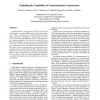Free Online Productivity Tools
i2Speak
i2Symbol
i2OCR
iTex2Img
iWeb2Print
iWeb2Shot
i2Type
iPdf2Split
iPdf2Merge
i2Bopomofo
i2Arabic
i2Style
i2Image
i2PDF
iLatex2Rtf
Sci2ools
102
click to vote
IPPS
1996
IEEE
1996
IEEE
Exploiting the Capabilities of Communications Co-Processors
Communications co-processors (CCPs) have become commonplace in modern MPPs and networks of workstations. These co-processors provide dedicated hardware support for fast communication. In this paper we study how to exploit the capabilities of CCPs for executing user level message handlers. We show, in the context of Active Messages and Split-C, that we can move message handling code to the co-processor thus freeing the main processor for computational work. We address the important issues that arise, such as synchronization, and the limited computational power and flexibility of CCPs. We have implemented co-processor versions of both Active Messages and Split-C. These implementations, developed on the Meiko CS-2, provide us with an excellent experimental platform to evaluate the benefits of a communications co-processor architecture.
Active Messages | Co-processor | Communications Co-processor | Distributed And Parallel Computing | IPPS 1996 |
Related Content
| Added | 07 Aug 2010 |
| Updated | 07 Aug 2010 |
| Type | Conference |
| Year | 1996 |
| Where | IPPS |
| Authors | Klaus E. Schauser, Chris J. Scheiman, J. Mitchell Ferguson, Paul Z. Kolano |
Comments (0)

